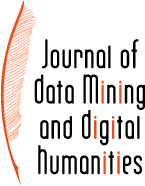 |
- Accueil
- Derniers articles
-
Numéros spéciaux
-
On the Way to the Future of Digital Manuscript Studies. Experiences and Challenges
-
Vers une robotique du traduire
-
Intelligence stratégique scientifique et technologique
-
L'intertextualité dans les langues anciennes
-
Science des données et humanités numériques
-
Atelier Digit_Hum
-
Visualisations en linguistique historique
-
Collecter, préserver et diffuser le patrimoine culturel menacé pour une nouvelle compréhension grâce à des approches multilingues
-
HistoInformatics : approches computationnelles de l’histoire
-
Traitement du langage naturel pour les humanités numériques
-
Documents historiques et reconnaissance automatique de textes
-
Chinese Natural Language Processing for Digital Humanities (CNLP4DH)
-
Intelligent computing for cultural heritage and digital humanities
-
On the Way to the Future of Digital Manuscript Studies. Experiences and Challenges
- La revue
- À propos
- Partenaires et référencement
- Consulter
- Auteurs
- Rechercher un article
- Conférences
- Mon espace